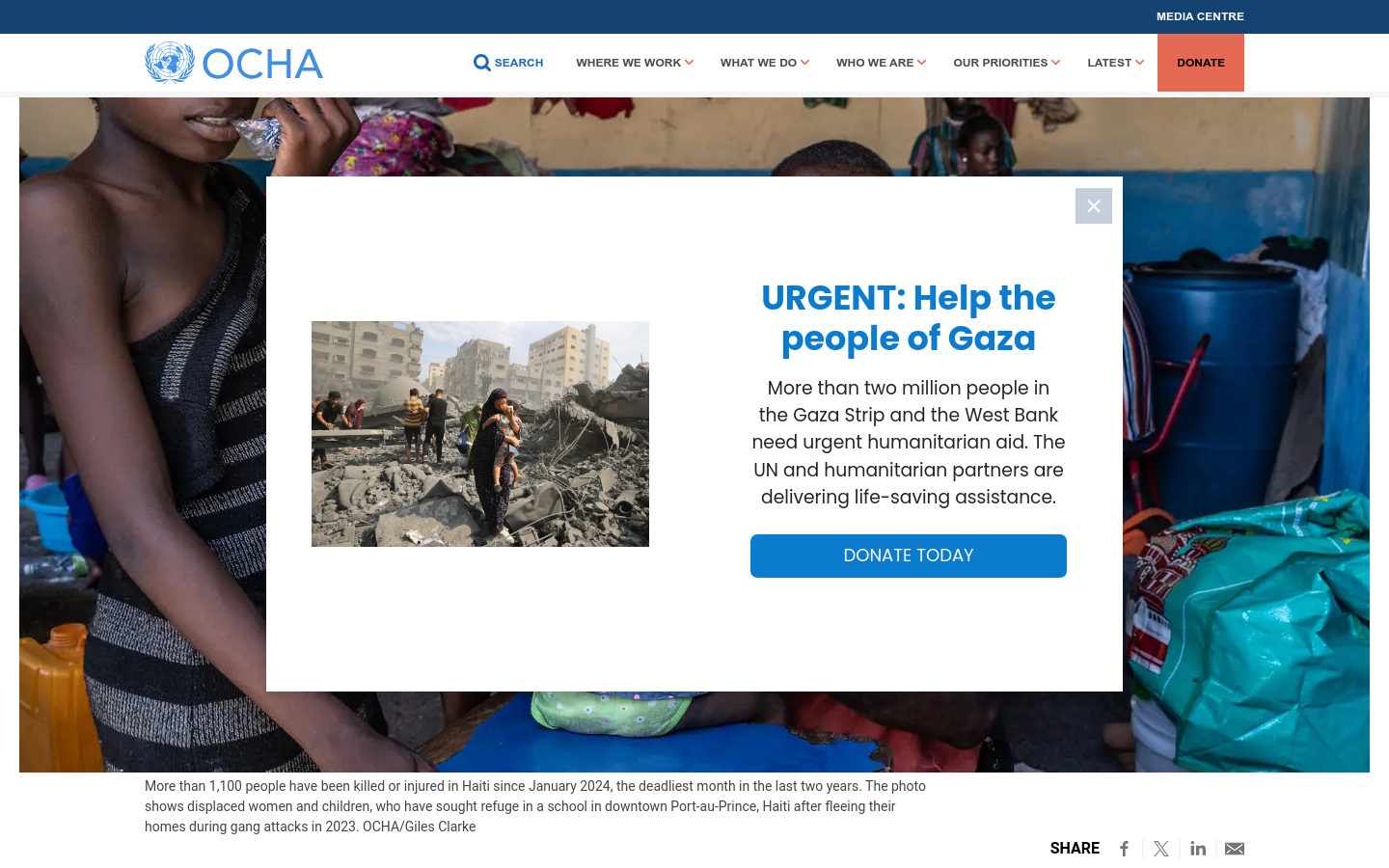Civic Tech Field Guide
Sharing knowledge and productively growing the fieldAdjacent Fields > Tech for public challenges > Disaster response and humanitarian tech - (161)
There's a long tradition of volunteer technologists rallying to aid communities in the aftermath of a disaster or humanitarian crisis. Many of the problems and solutions, such as managing skilled volunteers remotely, apply to other domains in the Civic Tech Field Guide. See also: Participatory Aid.
Showing 161 Results

GeoMSF Platform
Washington, DCA full suite of mapping and geodata tools developed by and for Medecins Sans Frontieres

AI for Changemakers
Poland (Polska)A global accelerator for AI innovators and nonprofits working to solve the world’s pressing challenges.

Evidence from Taliban-controlled Afghanistan shows that digital aid is a cost-effective, credible, and efficient way to reach vulnerable populations, in this case poor, tech-illiterate, female-headed households, in fragile states.

Rapid integrates advanced mapping tools, authoritative geospatial open data, and cutting-edge technology to empower OpenStreetMap mappers at all levels to get started quickly, making accurate and fresh edits to maps.

We initially designed it as a decision support tool for humanitarian mappers. Now it has grown in functionality and use cases. Whether you work in disaster management, build a smart city, or perform research on climate change, Disaster Ninja can help you in a number of ways (see more info on website).

Mapeo is a free, easy-to-use, open source set of tools for collecting and mapping information. Mapeo was built by Digital Democracy with and for earth defenders to easily document environmental & human rights information and to collect data about their land. It was designed to work in entirely offline environments, is highly customizable, and built on a decentralized peer-to-peer database that allows communities to own their own data.

The Export Tool is an open service that creates customized extracts of up-to-date OSM data in various file formats.

MapRoulette has dozens of mapping Challenges that are created by experienced mappers. Each Challenge is about improving OSM in one very specific way

Damage assessment software designed to rapidly and accurately collect damage assessments for FEMA’s disaster declaration process

FloodLight
PakistanA Code for Pakistan initiative to Crowdsource the flood-related data from the 2022 Floods in Pakistan.

Data For Crisis
TallinnA collaborative work between DW Akademie and SocialLab to provide credible raw and aggregated data from Social Networks about crisis-related topics like COVID and Migration to support media practitioners and researchers with free access to public data

KIKI, Virtual Human Interpreter
Japan (Nihon or Nippon)The world's first text-to-sign interpreter for emergency alerts

Portable Network Kits
New York City, NY, USAThe Portable Network Kit (PNK) is a wireless network in a suitcase that helps people understand how to build their own mini-internet – and with it, how the internet works and might be owned and governed more equitably.

Bangladesh Open Innovation Lab (BOIL)
Dhaka, BangladeshOur aim is to build a community that supports the Open Data and uptake of the Living Lab paradigm.

Climate Intelligence (CLINT)
EuropeThe CLIMATE INTELLIGENCE – alias CLINT – project is a European-funded project whose main objective is to develop an Artificial Intelligence framework composed of Machine Learning techniques and algorithms to process big climate datasets for improving Climate Science...

Hurricane Mapping (Sea Island Software)
Richmond, VAWe are Sea Island Software, Inc., a company specializing in hurricane threat assessment. HurricaneMapping.com is our storm tracking service for Google Earth and ESRI's ArcGIS.

HURREVAC
Richmond, VAHURREVAC is the decision support tool of the [US] National Hurricane Program, administered by FEMA, the USACE, and the NOAA National Hurricane Center.

British Red Cross
United Kingdom of Great Britain and Northern Ireland (the)The British Red Cross helps people in crisis, whoever and wherever they are. We are part of a global voluntary network, responding to conflicts, natural disasters and individual emergencies.

The State of Open Humanitarian Data 2024
Humanity Hub, Fluwelen Burgwal, The Hague, NetherlandsA ten-year anniversary retrospective on the Humanitarian Data Exchange, which was accessed by 1.4 million people in 230 countries to download 2.7 million open humanitarian datasets in 2023.

Oxfam’s UnBlocked Cash project (UBC) is a blockchain-powered cash transfer solution that is set to tackle this challenge

AID:Tech
Dublin, IrelandAID:Tech was established in 2015 and was the first company in the world to deliver international aid over blockchain technology.

Kare
Dublin, IrelandAID:Tech’s Kare Platform Enables Fast & Instant Disbursements to Survivors Via Digital ID

We provide research and development to support decision making in the field of sustainable mobility and humanitarian aid. We accomplish this through open geoinformation, open methods, open software and close collaboration with our partners.

ReliefWeb Numbers
New York CityThe new ReliefWeb Numbers site aims to deliver easily discoverable topline numbers on the world's most pressing humanitarian crises.

Humanitarian ID
New York CityHumanitarian ID is an authentication service managed by the United Nations Office for the Coordination of Humanitarian Affairs (UNOCHA).

Jobs4Dev
New York CityA mobile app to help humanitarians find their ideal role. Search for jobs and filter via organisation, location, experience and career category. Save jobs to your library, share with others and apply directly through the app.

ReliefWeb
New York CityInforming humanitarians worldwide

Kyiv Digital app
KyivDigitized the city's services, including e-petition tool, and "adapted them to conditions under martial law"

Welcome Alliance
Germany (Deutschland)The Welcome Alliance is an alliance of civil society organizations, foundations, state institutions and companies initiated by ProjectTogether. Our goal is humane, needs-oriented and sustainable integration and participation of all new immigrants in Germany.

Chatbots in humanitarian contexts
United Kingdom of Great Britain and Northern Ireland (the)Report by the British Red Cross on aid groups' rush to use chatbots, from a skeptical perspective

Sudan Safe Passages Amen
Khartoum, Sudan"Sudan Safe Passages, a volunteer group of local and diaspora Sudanese, has built an app called Amen, said Hiba Sharief, a Silicon Valley veteran and senior technology executive at Amazon Web Services. Amen uses crowdsourced data to send real-time updates on secure transport routes and hospital availability." - Damilare Dosunmu

ReliefWeb Response
New York CityRW Response aggregates operational content from existing platforms and provides an authoritative source of information in new and existing humanitarian operations.

Nidaa
Khartoum, Sudan"Just three days after the war started, Sudanese market intelligence firm DataQ launched a platform called Nidaa (meaning “call for help” in Arabic). It allows people in distress to post their requirements — from money and groceries to medical services and a ride to safety — so volunteers can reach out to them."

With its partners, OCHA contributes to principled and effective humanitarian response through coordination, advocacy, policy, information management and humanitarian financing tools and services.

PetaBencana.id
JakartaPetaBencana.id provides residents, government agencies, and first responders with a real-time disaster information sharing system at an unprecedented scale. It is the first platform of its kind to harness the power of crowdsourcing through social media to aid humanitarian response and recovery.

Urban Ocean Lab
San FranciscoUrban Ocean Lab cultivates rigorous, creative, equitable, and practical climate and ocean policy for the future of coastal cities.

A native app that allows you to monitor more than 35 different severe weather and emergency alerts in your town, and other cities that matter to you, such as hurricanes, earthquakes and tornados.

Welcome Humanitarian Data & Digital Enthusiasts! Here You Can Find All Things Related To Data & Digital.

HOT's Approach to OSM Data Validation for Earthquake Response Mapping
1100 13th Street NW Suite 800 Washington, D.C. 20005Because OpenStreetMap is a crowd-sourcing project where everyone can freely contribute to the map, the Humanitarian OpenStreetMap Team has devised measures to support high-quality crowd-sourced OSM data.

Humanitarian Innovation Fund
CardiffAim: to improve outcomes for people affected by humanitarian crises by identifying, nurturing and sharing more effective and scalable solutions.

Beyond Borders: Satellite Applications for Humanitarian Emergencies
United Kingdom of Great Britain and Northern Ireland (the)A report by the UK Humanitarian Innovation Hub

UK Humanitarian Innovation Hub (UKHIH)
United Kingdom of Great Britain and Northern Ireland (the)The UK Humanitarian Innovation Hub (UKHIH) will promote and support strategic and focused collaborations across government, science, private and humanitarian actors to drive urgently needed innovations and technologies in humanitarian responses to disasters and conflict.










